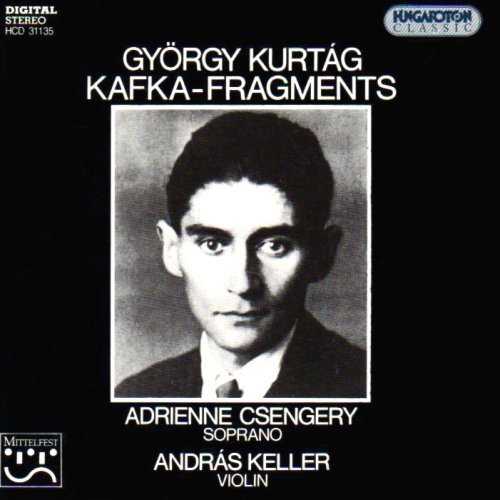
Composer: Gyorgy Kurtag
Performar: Adrienne Csengery, Andras Keller
Audio CD
Number of Discs: 1
Format: FLAC (image+cue)
Label: Hungaroton
Size: 175 MB
Recovery: +3%
Scan: yes
01. The good march in step…
02. Like a pathway in the autumn
03. Hiding-places
04. Restless
05. Berceuse I
06. Nevermore (Excommunicatio)
07. ‘But he won’t stop asking me’
08. Someone tugged at my clothes
09. The seamstresses
10. Scene at the station
11. Sunday, 19th July 1910 (Berceuse II)
12. My ear…
13. Once I broke my leg (Chassidic dance)
14. Enarmoured
15. Two walking-sticks (Authentic-plagal)
16. No going back
17. Pride (15th November 1910, 10 o’clock)
18. The flower hung dreamily (Hommage a Schumman)
19. Nothing of the kind
20. The true path (Hommage-message a Pierre Boulez)
21. To have? to be?
22. Coitus as punishment (Canticulum Mariae Magdalenae)
23. My Fortress
24. I am dirty, Milena
25. Miserable life (Double)
26. The closed circle
27. Destination, path, hesitation
28. As tightly
29. Offensively Jewish
30. Hiding-places (Double)
31. Amazed, we saw the great horse
32. Scene on a tram, 1910
33. Too late (22nd October 1913)
34. A long story
35. In memoriam Robert Klein
36. From an old notebook
37. Leopards
38. In memoriam Joannis Pilinszky
39. Again, again
40. The moonlit night dazzled us
40 miniatures, an absurd fragmented slice of life
KAFKA-FRAGMENTE is 40 very short pieces for soprano and violin, a cycle of a little less than an hour — this is the first recording from 1990, with Adrienne Csengery singing soprano and Andras Keller on violin, the same artists who first performed the work in the spring of 1987. The Hungaroton recording was made in the Kalvaria Church in Szombathely, Hungaria. The first free elections following the state socialist era were held in March 1990 — I’m not sure whether the recording was made before or after. But the composition dates from the last years of state socialism, which is worth bearing in mind while listening.
Kurtag is well-known for saying his music is made out of almost nothing. KAFKA-FRAGMENTE is certainly a case in point — just a voice and a violin above the abyss, a few essential things, conveying much with little. An incredible creation — powerful existentialism. The liner notes are quite informative and include all the lyrics. Kafka was Jewish, like Kurtag. He lived in Prague. Kafka’s concerns were spiritual, theological, and quotidian — he had more doubts than certainty, but was a seeker.
Musically, the closest parallel clearly seems to be PIERROT LUNAIRE, though Kurtag’s single biggest musical influence is Webern. I find it strangely compelling. It is certainly one of Kurtag’s masterpieces, and in fact I would say it is a masterpiece of the late 20th century. While there is some variation, overall the mood is full of angst and hints of tragedy. The atonal music does not convey the depth and range of emotion attributed to the work by some writers.
Here are some sample lyrics (it’s sung in German, but the Hungaroton booklet provides English translations):
“Slept, woke, slept, woke, miserable life”
“The true path goes by way of a rope that is suspended not high up, but rather just above the ground. Its purpose seems to be more to make one stumble than to be walked on.”
“There is a destination, but no path to it; what we call a path is hesitation.”
“The moonlit night dazzled us. Birds shrieked in the trees. There was a rush of wind in the fields. We crawled through the dust, a pair of snakes.”
“On the stock of Balzac’s walking-stick: ‘I surmount all obstacles.’ On mine: ‘All obstacles surmount me.’ They have that ‘all’ in common.”
This was the first of what are now four recordings of KAFKA-FRAGMENTE, which was written in 1985-6. The second recording was by the Finnish Ondine label, featuring the young Finnish couple Anu Komsi, soprano, and Sakari Oramo on violin. The recording, in August 1995, was the only one of the four to date not supervised by the composer. The third recording by ECM took place ten years later in September 2005, and was released to celebrate the composer’s 80th birthday in 2006. Most recently the cycle has been recorded as a 2009 CD/DVD combination for Bridge records. The Bridge recording features Tony Arnold’s soprano and Movses Pogossian on violin, and the DVD includes a performance as well as a clip of Kurtag coaching the performers. I was sure a Dawn Upshaw recording was in the works at one point, as she sang the KAFKA-FRAGMENTE in January of 2005 in NYC with Geoff Nuttall on violin in a dramatic performance, doing housework, with black-and-white photo projections. But that has not materialized.
I would not say this is the definitive recording, though it is well worth hearing it performed in proximity to its composition in its formative Hungarian environs. Adrienne Csengery has a beautiful operatic voice, and sings beautifully rather than attempting the difficult sprechstimme technique, a half-spoken singing probably best known from Schoenberg’s “Pierrot Lunaire.” Keller’s performance has the freshness of discovery, but his long-seasoned performance on the ECM disc with better sound is ultimately preferable. This Hungaroton recording sounds as if you are sitting a third of the way back in the church, as opposed to the other two recordings which place the listener up close to the performers. The ECM recording is probably the most accessible at this point, and it is a fine performance and recording. But I still have great fondness for the Ondine, which I heard first. Komsi’s soprano is more pure and thin than either Banse or Csengery, and the Ondine production is brighter, with the musicians foregrounded, and without the deep resonance that famously characterizes Manfred Eicher’s ECM productions.
KAFKA-FRAGMENTE is a masterpiece of the late 20th century, and should be heard by all modern and contemporary music listeners.
Thank you very much for sharing.
This is a rather rare piece of music. :grin: